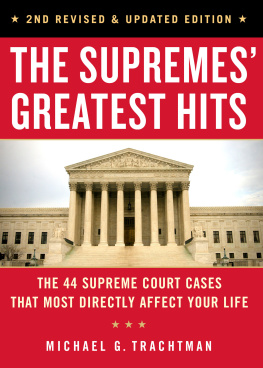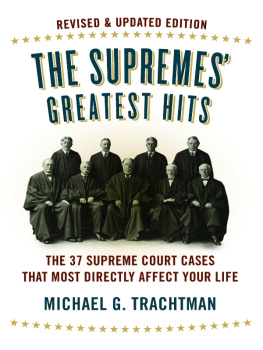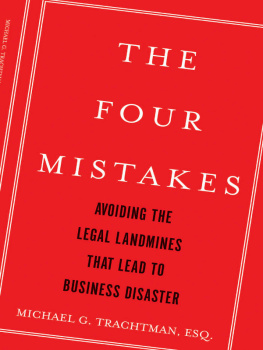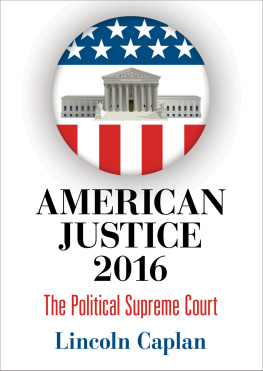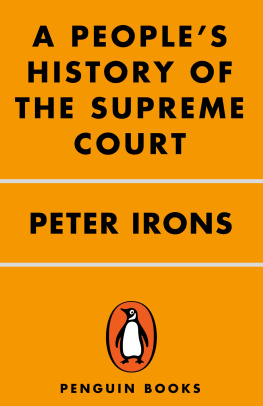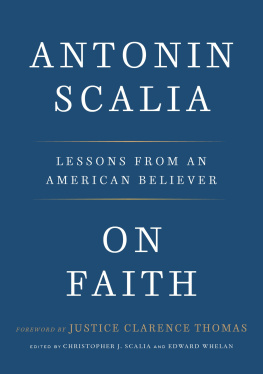STERLING and the distinctive Sterling logo are registeredtrademarks of Sterling Publishing Co., Inc.
2007, 2009, 2016 by Michael G. Trachtman
All rights reserved. No part of this publication may be reproduced,stored in a retrieval system, or transmitted in any form or by any means(including electronic, mechanical, photocopying, recording, or otherwise)without prior written permission from the publisher.
For information about custom editions, special sales, and premiumand corporate purchases, please contact Sterling Special Sales at 800-805-5489or specialsales@sterlingpublishing.com.
CONTENTS
THE DANGERAND THE POST-SCALIA FUTUREOF THE ROBERTS COURTS5-4 DECISIONS
HOW THE SUPREME COURT BECAME SUPREME
Marbury v. Madison (1803)
Dred Scott v. Sandford (1857)
ONE NATION UNDER GOD? MATTERS OF CHURCH AND STATE
Engel v. Vitale (1962)
Epperson v. Arkansas (1968)
Van Orden v. Perry (2005)
McCreary County, Kentucky v. ACLU of Kentucky (2005)
Town of Greece v. Galloway (2014)
Burwell v. Hobby Lobby Stores, Inc. (2014)
INNOCENT UNTIL PROVEN GUILTY: THE RIGHTS OF THE ACCUSED
Gideon v. Wainwright (1963)
Miranda v. Arizona (1966)
THE MELTING POT: RACE, DISCRIMINATION, AND DIVERSITY
Brown v. Board of Education (1954)
Gratz v. Bollinger (2003)
Grutter v. Bollinger (2003)
Fisher v. University of Texas (2016)
PLAYING POLITICS
Citizens United v. Federal Election Commission (2010)
Bush v. Gore (2000)
THE RIGHT TO DO WHAT YOU WANT
Griswold v. Connecticut (1965)
Roe v. Wade (1973)
Planned Parenthood v. Casey (1992)
Whole Womans Health v. Hellerstedt (2016)
Washington v. Glucksberg (1997)
District of Columbia v. Heller (2008)
McDonald v. City of Chicago (2010)
Obergefell et al. v. Hodges (2014)
BIG GOVERNMENT IN YOUR BUSINESS AND YOUR BACKYARD
West Coast Hotel Co. v. Parrish (1937)
Heart of Atlanta Motel v. United States (1964)
Katzenbach v. McClung (1964)
Burlington Industries v. Ellerth (1998)
Standard Oil Co. v. United States (1911)
Kelo v. City of New London (2005)
Monroe v. Pape (1961)
limiting the Imperial Presidency
Youngstown Sheet & Tube Co. v. Sawyer (1952)
United States v. Nixon (1974)
Boumediene v. Bush (2008)
Al Odah v. U.S. (2008)
HOW FREE IS FREE SPEECH?
Brandenburg v. Ohio (1969)
Miller v. California (1973)
Texas v. Johnson (1989)
New York Times Co. v. Sullivan (1964)
New York Times Co. v. United States (1971)
OLD LAWS AND NEW TECHNOLOGIES
MGM Studios Inc. v. Grokster, Ltd. (2005)
ABC, Inc. v. Aereo, Inc. (2014)
Kyllo v. United States (2001)
Riley v. California (2014)
ACKNOWLEDGMENTS
It was John Boswells idea that this book should be written, andthat I should be the one to write it. I am extremely grateful for hiscreativity and generosity, and for the help he has freely given me in my effortto fulfill his vision.
The book would not have been possible without SterlingPublishings willingness to support and expertly assist my chosen approach tothis subject matter, and I am most appreciative of the fact that Sterling haspartnered with me to update the book as the Supreme Court moves through one ofthe most consequential periods in its history. In particular, my editor,Barbara Berger, has been a source of encouragement and expertise, and I wish tothank her for, among many other things, helping me to bridge the cavernous gapbetween being a lawyer and being an author.
Lawyers sometimes forget how to write and think like non-lawyers.My wife, Jen, provided invaluable simultaneous translation services as I struggledto overcome those disabilities. Many apologies to her and my son, Ben, for theattention paid to this manuscript at their expense, and many more thanks fortheir understanding and encouragement.
AUTHORS NOTE
I have made some admittedly arbitrary and subjective decisionsrespecting which Supreme Court cases deserve to be included in the forty-fourcases that are featured in this book. Many cases, while of great importancewithin the context of a specific legal issue, do not have a broader societalimpact. There are cases that may seem significant now, but are likely to fadeover time. And there are cases that fall into gray areas that require difficultjudgment calls. I have done my best to apply these and a myriad of othercriteria to the task.
My decisions are, certainly, subject to what would be a healthyand (at least for me) enjoyable debate. For example, National Federation ofIndependent Businesses v. Sebelius(2012) established(in a convoluted way) the constitutionality of the core provisions of theAffordable Care ActObamacarebut beyond that, it did not secure the futureof Obamacare or establish or clarify constitutional principles that willsubstantially influence the law beyond that immediate result. Similarly, inShelby County v. Holder (2013), the Supreme Court overturned aprovision of the Voting Rights Act that had prohibited nine states with ahistory of discriminatory voting practices from changing their electionprocedures without approval by the federal governmentan important decision forvoters in those states but, most likely, not a decision that will have a majorimpact on the law outside of that context.
Once the forty-four cases were selected, I struggled toobjectively explain and analyze them, as well as the competing viewpoints theyhave engendered. I have also struggled to base my criticisms of judicialopinions and approaches on law and logic, and not on my personal viewpoints. Iwill consider those struggles to have been a success if this book equips thereader with enough information and insight to tell me how and why I failed.
INTRODUCTION
A GOVERNMENT OF LAWS, NOT MEN
High school civics students are taught that our system ofgovernment is composed of three branches: the legislature makes the laws; theexecutive enforces the laws; and the courts interpret the laws. As for theSupreme Court, they know that it is the highest court in the landthe finalword on legal disputes.
So far as it goes, all of this is true. But to describe theSupreme Court in this way is to describe champagne as grape juice, or the GrandCanyon as a river valleyaccurate to a point, but so shallow and incomplete asto be grotesquely misleading. Over 175 years ago, Alexis de Tocqueville, thecelebrated French political observer, studied the Supreme Court and concluded,A more imposing judicial power was never constituted by any people. The sameholds true today.
The Ultimate Check and Balance: Judicial Review
Like the highest courts of other democracies, the Supreme Courthas the authority to decide, once and for all, what important laws really meanwhen applied to the real-life situations that arise after the laws are enacted.Does the Civil Rights Act of 1964 protect women against sexual harassment? Doesthe Americans with Disabilities Act cover people with certain heart conditions?Various lower courts disagreed. The Supreme Court interpreted the wording andintent of the statutes and made a ruling. End of controversy.

